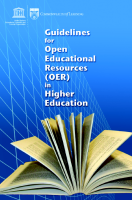UNESCO recommends open educational resources

![]() "Guidelines for Open Educational Resources (OER) in Higher Education" by UNESCO and COL
"Guidelines for Open Educational Resources (OER) in Higher Education" by UNESCO and COL
Source: col.org
The United Nations Educational, Scientific and Cultural Organisation (UNESCO), and the Commonwealth educational organisation, the Commonwealth of Learning (COL), have published guidelines on the use of open educational resources in higher education. The 20-page Guidelines for Open Educational Resources (OER) in Higher Education![]() document argues that the number of students is set to rise from the current 165 million to around 260 million in 2025, but that this will not be matched by a corresponding rise in expenditure.
document argues that the number of students is set to rise from the current 165 million to around 260 million in 2025, but that this will not be matched by a corresponding rise in expenditure.
It sees increased use of open educational resources (OER), which are either in the public domain or are licensed under a creative commons style licence permitting reuse, as an answer to the impending squeeze. In an age in which digitising and copying content is simple, they see licences of this type as one solution to protecting authors' rights – the "all rights reserved" approach of traditional copyright is replaced by a more flexible legal framework. In tandem with modern communications and computer technology and social networks, they believe that open licences offer the ability to develop educational materials on a collaborative basis and to adapt existing materials to local requirements, without the need for time-consuming licence negotiations or repeating work already done.
The document calls on governments to ensure that materials produced using state funds are made available under an open licence. It calls on governments to create the political conditions to encourage the production and use of open educational resources and to raise the profile of OER within the educational system. The guidelines suggest that universities need to develop strategies for including open educational resources in their programs. It says that a framework for the publication of OER is needed and that universities need to take responsibility for providing teaching staff and students with access to computers and for procedures for provisioning and providing access to OER.
It asks teaching staff at universities to engage with the issue of open educational resources, to publish resources they have developed and to adapt existing OER. Networking between teaching staff and the involvement of students are seen as important tools for achieving this. Publicising OER is also seen as important. Students could also release their work as OER, contribute to quality control via social networks and get involved in developing open educational resources. The document also calls on bodies involved in quality assurance of teaching materials to engage with OER. An appendix lists knowledge, competences and skills for the effective use of OER in higher education.
See also:
- Open Source, Open Science, Open Source Science, a feature from The H.
(crve)
![Kernel Log: Coming in 3.10 (Part 3) [--] Infrastructure](/imgs/43/1/0/4/2/6/7/2/comingin310_4_kicker-4977194bfb0de0d7.png)

![Kernel Log: Coming in 3.10 (Part 3) [--] Infrastructure](/imgs/43/1/0/4/2/3/2/3/comingin310_3_kicker-151cd7b9e9660f05.png)
















